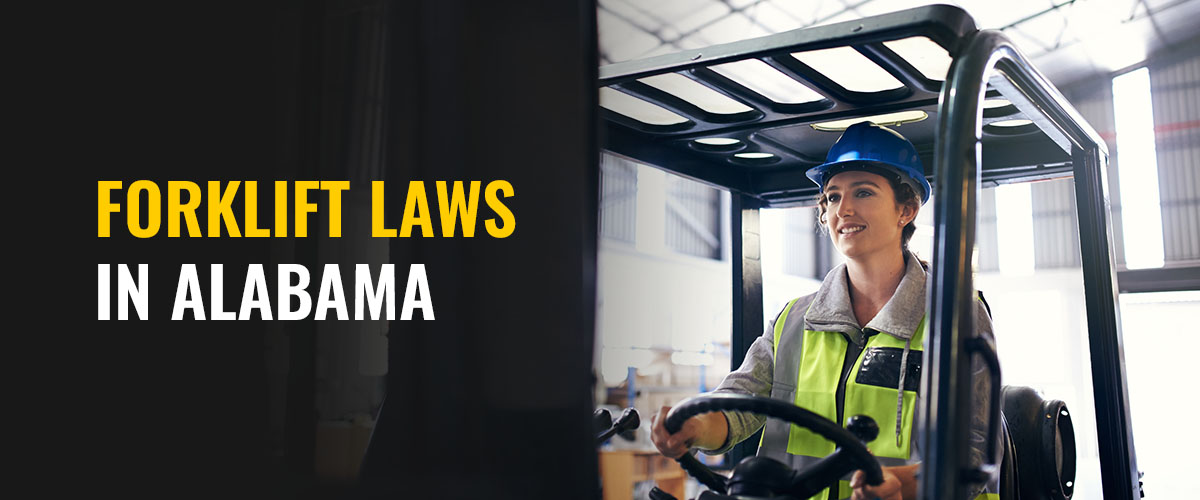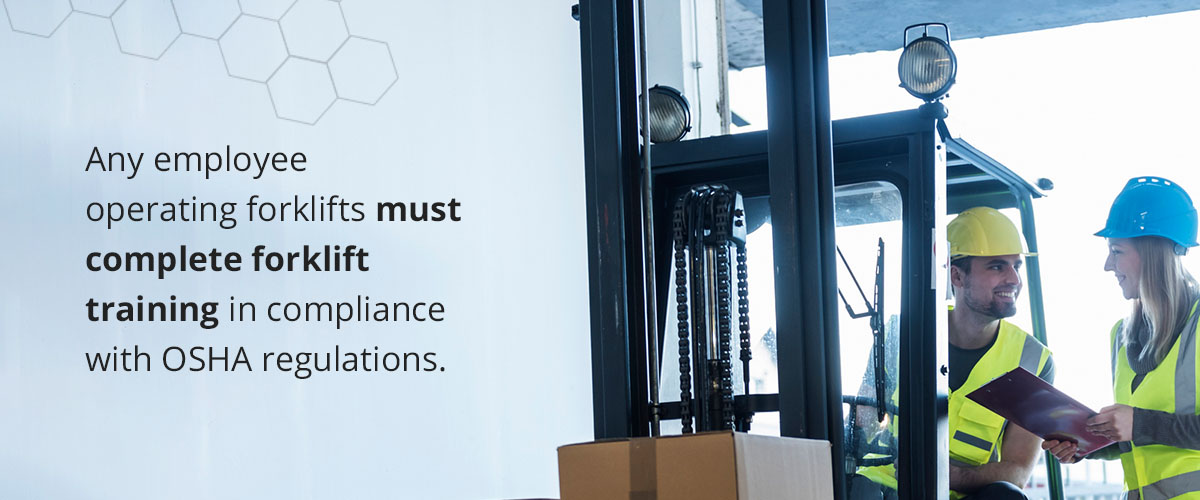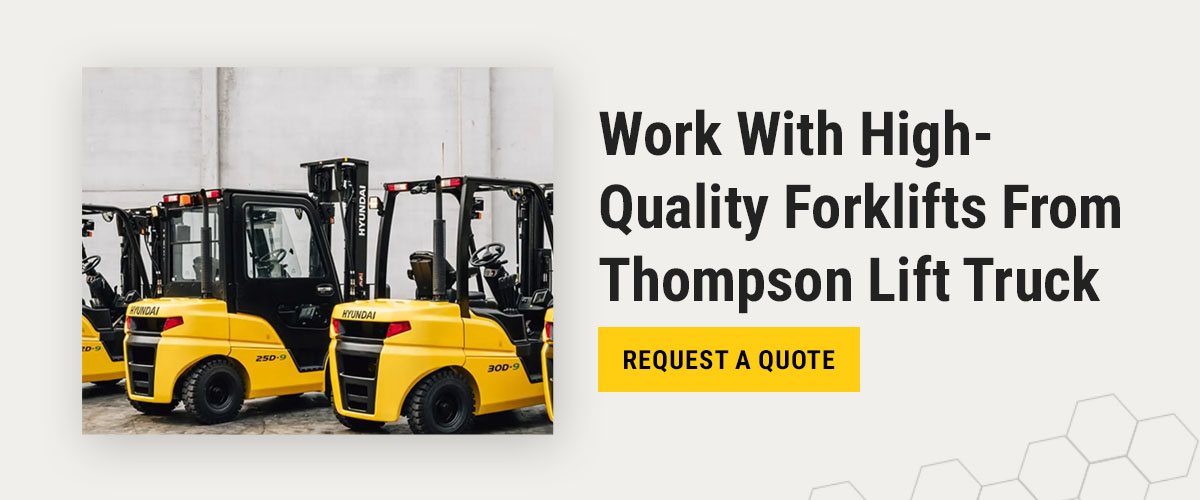
Forklift Laws in Alabama

To comply with Alabama law, forklift operators must adhere to the requirements that the Occupational Safety and Health Administration (OSHA) outlines for safe training, operation, and maintenance. Forklift laws keep operators and individuals around them safe from potential hazards and protect facilities and equipment from damage. Understanding forklift laws in Alabama is essential to maintaining safety and ensuring operators comply with regulations.
Importance of Alabama Forklift Compliance
Forklift laws in Alabama are essential because they protect forklift operators, other employees, and equipment. Forklift operation is associated with common hazards such as the following:
- Collisions: Collisions can occur if forklift operators ignore safety regulations, potentially harming the operators, surrounding pedestrians, or other equipment.
- Falls: Unsecured loads or workers can fall off forklifts if operators do not follow guidelines.
- Tipping forklifts: Imbalanced loads or excessive speed can cause forklifts to tip over, potentially injuring operators or surrounding workers.
Following forklift laws reduces these risks to ensure operators and employees can complete their jobs safely. Forklift laws also prevent facility and equipment damage.
What Are the Alabama OSHA Regulations for Forklifts?
OSHA has regulations to ensure forklift operators keep themselves, the people around them, their workplace environment, and industrial equipment safe. While it’s important to follow all OSHA guidelines when operating forklifts, here are some of the top operational requirements to keep in mind:
Safe Operation and Driving
Forklift operators must handle and operate forklifts safely to prevent injury to themselves and others. Always practice safe stopping, and keep speed at a minimum. Never drive a forklift up to an individual standing in front of a fixed object, and never permit individuals to stand or walk under an empty or loaded elevated forklift portion. Unauthorized personnel should not ride on a forklift or attempt to operate a forklift.
Operators must travel up and down grades slowly and maintain a safe distance between other industrial vehicles. Always ensure forklifts are turned off before filling fuel tanks, and remove forklifts from service if they require maintenance or repairs. Make sure all operators only handle safely-arranged loads within the forklift’s acceptable weight limit.
Unattended Forklifts
OSHA considers a forklift unattended if it is out of an operator’s sight or an operator steps 25 feet or more away from it. When an operator leaves a forklift unattended, they must lower the load engaging means, neutralize the controls, shut the power off, and set the brakes. If they park the forklift on an incline, they must block the forklift’s wheels. Be sure to follow all OSHA regulations listed in section 1910.178 when leaving a forklift unattended.
Proper Design, Construction, and Labeling
If you purchase a new forklift, it must meet certain design and construction requirements. Forklifts should also display an identifying mark or label indicating a testing laboratory’s approval.
Perhaps your forklift has front-end attachments other than the original attachments. In that case, you must meet Alabama forklift attachment compliance by ensuring the truck is marked to identify the new attachments and the approximate weight of the forklift with the new attachments at maximum elevation holding a laterally-centered load. Maintain all forklift nameplates and markings to ensure they remain legible.
Safety Guards and Backrest Extensions
OSHA requires forklifts to have overhead guards unless operating conditions do not allow for a guard. If an operator needs to move a load that presents a hazard, they must equip the forklift with a vertical load backrest extension.
Seat Belts
There are no specific Alabama forklift seat belt laws, but OSHA requires employers to protect employees from potential hazards. A forklift operator must wear a seat belt any time a forklift has one. OSHA can also mandate seat belt installations when forklifts lack seat belts.
Alabama Forklift Training Laws
Any employee operating forklifts must complete forklift training in compliance with OSHA regulations. Each operator must complete training and pass an evaluation that proves their competence. Training programs should combine the following methods:
- Formal instruction: Formal instruction consists of videos, lectures, discussions, written materials, videos, and interactive computer learning.
- Practical training: Trainers should deliver practical training by performing demonstrations and facilitating practical exercises for trainees.
- Evaluation: Trainers must also evaluate trainees to ensure they can operate a forklift properly and safely.
To train forklift operators, trainers must have the required training, knowledge, and experience to train and evaluate industrial truck operators. OSHA requires forklift training programs to cover the following topics:
- Operating warnings, precautions, and instructions for forklifts
- Differences between forklifts and automobiles
- Where forklift controls are located, how they work, and what functions they perform
- Engine operation
- Maneuvering and steering
- Visibility and how to handle potential visibility restrictions during loading
- Forklift use, operation, and adaptation limitations
- Forklift capacity and stability
- Any maintenance or inspection tasks the operator will have to perform
- Operating limitations
- Proper battery charging or refueling protocols
- Any warnings, precautions, or instructions listed in the operator’s manual
Forklift operator trainers must also ensure their training programs cover the following workplace-related topics:
- Surface conditions in areas workers will operate forklifts
- Pedestrian traffic where workers will operate forklifts
- Load composition and stability
- Load manipulation, stacking, and unstacking
- Narrow aisles, restricted areas, and hazardous locations where workers may need to operate forklifts
- Maintaining stability on sloped surfaces such as ramps
- Environments where carbon monoxide could potentially build up due to poor ventilation or improper vehicle maintenance
- Any potentially hazardous workplace conditions that could affect operating a forklift safely
Forklift operators must complete refresher training and evaluation every three years to ensure they still possess the skills and knowledge necessary to operate forklifts safely. An operator may also need to complete refresher training in the following situations:
- Observation of the operator using a forklift improperly or in an unsafe manner
- The operator is involved in a forklift accident or near-miss incident
- An evaluation reveals that the operator is not operating the forklift safely
- The operator receives an assignment to use a different type of forklift
- Workplace conditions change in a way that can affect safe forklift operation
Work With High-Quality Forklifts From Thompson Lift Truck
Safe forklift operation requires operators to follow essential OSHA regulations. Practicing proper operation, maintaining a safe driving speed, completing required training, and working with quality forklifts that meet regulations are some of the top forklift laws in Alabama.
Thompson Lift Truck offers world-class forklifts, equipment, and services to meet our customers’ needs. We are one of America’s leading forklift dealers, and we offer various first-rate products from trusted companies. Request a quote or learn more about how Thompson Lift Truck can supply your company with quality forklifts that meet requirements.


